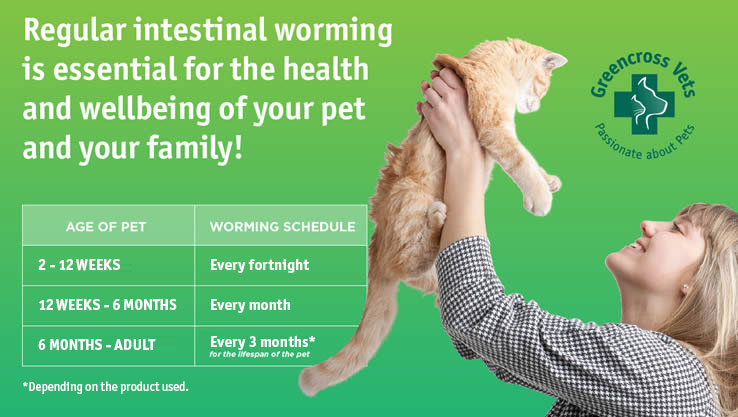
Why should I worry about intestinal worms?
Intestinal worms are parasites that all pet owners should worry about. Regular worming is an important yet often overlooked part of your pet’s healthcare routine. As a rule, all puppies and kittens need to be wormed every two weeks until they’re three months of age, then every month until they reach six months of age, and finally, depending on the product, every three months for the rest of their life.
Dogs and cats can become infected with a range of intestinal worms including hookworms, roundworms, whipworm (dogs only), and tapeworm. Intestinal worms can be transferred from our pets to human family members. Whilst everyone can be infected by intestinal worms, children, the elderly, and people who are immunocompromised are at a higher risk.
In most cases, dogs and cats become infected with parasites when they clean and lick their own feet, the environment or each other. Microscopic worm eggs and larvae become attached to your pets’ paws when they walk over an infected area. Once inside your pets’ digestive system, it only takes a few weeks for the eggs or larvae to mature into adult worms. These adult worms continue to lay eggs inside your pet, at which point you may notice small, white flecks in your pets’ faeces; these are worm eggs. If an infected pet licks their bottom and then licks you or another family member, or even if you or a family member simply pat an infected pet, you can become infected with these parasites.
How Do I Protect My Pet From Intestinal Worms?
Your pet can pick up intestinal worms from a variety of sources, including other infected animals, soil, or even fleas. While not always immediately obvious, worms can cause serious health issues for your dog or cat if left untreated. Protecting your pet from intestinal worms is essential for their overall health and well-being, and the good news is that it’s fairly simple with the right preventative measures.
- Regular Deworming: Most vets recommend deworming pets every three months, but this may vary based on your pet’s age, lifestyle, and health status.
- Flea Control: Preventing fleas not only keeps your pet comfortable but also helps prevent tapeworm infestations.
- Clean Living Environment: Regularly clean your pet’s bedding and living areas.
- Routine Veterinary Visits: Regular check-ups with your local Greencross Vet will ensure early detection of any health issues, including worms.
Types of Intestinal Worms in Pets
1. Roundworms
Roundworms are one of the most common intestinal parasites in pets. These long, spaghetti-like worms can be transmitted through contaminated soil, ingestion of infected animals, or even from the mother to puppies or kittens during pregnancy or nursing.
2. Hookworms
Hookworms are small, thin worms that attach themselves to the intestinal wall and feed on your pet’s blood. They can be passed on through ingestion of contaminated soil, infected animals, or even through the skin, especially in areas where animals defecate.
3. Tapeworms
Tapeworms are segmented worms that typically live in the intestines. Pets often get tapeworms by swallowing fleas infected with tapeworm larvae.
4. Whipworms
Whipworms are small, thin worms that reside in the large intestine of dogs. They can be difficult to detect because they often don’t shed large numbers of eggs, but they can cause serious issues such as inflammation and discomfort.
Symptoms of Intestinal Worms in Pets
While some pets may not show immediate signs of an intestinal worm infestation, others may experience a variety of symptoms. The severity of these symptoms often depends on the type of worm and the level of infestation.
- Weight loss
- Diarrhea and Vomiting
- Distended Abdomen (Potbelly)
- Lethargy and Weakness
- Scooting or Excessive Licking
- Coughing
How to Treat Intestinal Worms in Pets
The good news is that intestinal worms are relatively easy to treat, especially if caught early. There are several effective treatments available, and your veterinarian can recommend the best course of action based on the type of worm affecting your pet.
1. Deworming Medications
Deworming medications are the most common treatment for intestinal worms. These medications, which can come in the form of tablets, liquids, or spot-on treatments, target the specific type of worm your pet is infected with.
2. Flea Control
Since tapeworms are often transmitted through fleas, keeping your pet on a regular flea prevention program is essential in controlling tapeworm infestations. Flea preventatives, such as spot-on treatments or oral medications, can help break the flea-tapeworm cycle.
3. Environmental Clean-Up
If your pet has been diagnosed with worms, it’s important to clean up their environment to prevent reinfection. This includes thoroughly cleaning your home, washing your pet’s bedding, and cleaning up any faeces in the yard.
Dog and cat worming chart


 Greencross Vets
Greencross Vets 










